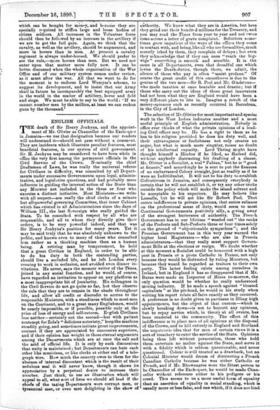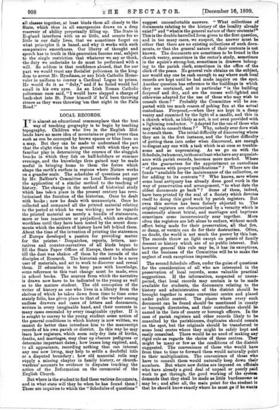ENGLISH OFFICIALS.
THE death of Sir Henry Jenkyns, and the appoint- ment of Mr. Olivier as Chancellor of the Exchequer iu Jamaica—we use that designation because our readers
will understand it—should not pass without a comment. They are incidents which illustrate peculiar features, most beneficial features, in our system of civil government.
Sir H. Jenkyns may be considered to have been while in office the very first among the permanent officials in the Civil Service of the Crown. Nominally the chief Draftsman of Laws, he was really the universal referee for Civilians in difficulty, was consulted by all Depart- ments under successive Governments upon legal, adminis- trative, and legislative questions, and bad probably more influence in guiding the internal action of the State than any Minister not included in the three or four who exercise a distinct initiative. Most Ministers—we write with all respect—are really the chief clerks of a minute but all-powerful governing Committee, that inner Cabinet which has existed in all Administrations since the days of William III., the last Sovereign who really guided the State. To be consulted with respect by all who are responsible, and all to whom they directly give their orders, is to be very powerful indeed, and that was Sir Henry Jenkyns's position for many years. Yet it may be said truly that he was absolutely unknown to the public, and known even to many of those who consulted him rather as a thinking machine than as a human being. A retiring man by temperament, he held that a great Civilian in England, in order to be able to do his duty to both the contending parties, should live a secluded life, and he left London every evening to work in seclusion, and avoided even dinner in- vitations. He never, says the memoir writer of the Times, joined in any social function, and he would, of course. have regarded an invitation to appear on any platform as a most inappropriate bit of jocularity. His colleagues in the Civil Service do not go quite so far, but they observe the rule that they are to remain in the shade throughout life, and allow all credit or discredit to accrue to the responsible Ministers, with a steadiness which to most men on the Continent, and to a great many Englishmen, would be nearly impossible, or if possible, possible only at the price of loss of energy and self-esteem. Ei'glish Civilians lose neither—certainly not the second—but with patient contempt for Zola's " delicious notoriety," keep the machine steadily going, and sometimes initiate great improvements, content if they are appreciated by successive superiors, and if their opinion has weight in those eternal arguments among the Departments which are at once the salt and the acid of official life. It is only by such discussions that unity is maintained ; but Departments can hate each other like musicians, or like clerks at either end of a tele- graph wire. How much the country owes to them for the absence of internal discontent which is the result of their sedulous zeal it will never know, though it shows its appreciation by a perpetual desire to increase their number. Just think, to use an illustration which will appeal to all, what sort of lives we should all lead if the chiefs of the taxing Departments were corrupt men, or tyrannical men, or even men delighting in the show of
authority. We know what they are in America, but here they grind out their hundred millions for the Treasury, and you may read the Times from year to year and not twice come across a letter of grave complaint. Solicitors some- times grow impatient. of the ways of the offices they come in contact with, and being, like all who use formalities, much secretly irked by them, they complain of delays ; but even they acknowledge that if they can once "reach the big- wigs" everything is smooth and sensible. It is the same in all Departments, even that dreadful one which levies the Death-duties, though there, we admit, the silence of those who pay is often " waist profane." Of course the great credit of this smoothness is due to the genius of the two men—Sir R. Peel and Mr. Gladstone— who made taxation at once bearable and drastic; but if those who carry out the ideas of those great innovators had not. been what they are England would have been a very different place to live in. Imagine a revolt of the money-spinners such as recently occurred in Barcelona, in the City of London.
The selection of MeOlivier for most important and special work in the West Indies indicates another and a most useful principle of English administration. Nobody in office ever thinks of what the private opinions of a lead- ing Civil officer may be. He has a right to them as he has to his religion provided he does his duty well, and their extravagance or foolishness not only creates no anger, but what is much more singular, raises no doubt of his intellectual capacity. Lord Thring might have thought himself a Hindoo if he liked, as Rallied did, without anybody distrusting his drafting of a clause. Mr. Olivier is a Socialist, a real" Fabian," but he is " good at finance," and accordingly he is sent to put the finances of an embarrassed Colony straight, just as readily as if he were an Individualist. It will not be his duty to establish Collectivism in Jamaica, and consequently everybody is certain that he will not establish it, or try any other tricks outside the policy which will make the island solvent and be acceptable to his superiors. He may believe like Lassalle, but he will act like Sir Robert Peel. That entire indifference to private opinions, that entire reliance on the professional sense of duty, would seem to most Continental Governments positively silly, a giving away of the strongest buttresses of authority. The French Government has in our lifetime " weeded out " the ranks of the Prefects and Sub-Prefects three or four times solely on the ground of "objectionable sympathies"; and the Prussian Government has in this very year warned the higher local Magistrates — who are also in Prussia administrators—that they really must support Govern- ment Bills at the elections or resign. We doubt whether at this moment a Socialist could be honoured with a high post in Prussia or a pious Catholic in France, not only because they would be distrusted by ruling Ministers, but because they would be regarded as traitors to their own party. The latter feeling exists among ourselves in Ireland, but in England it has so disappeared that if Mr. Burns were made an Inspector of Mines to-morrow, the only question would be whether he really understood mining industry. If he made a speech against " bloated capitalists " at the pit-head, he would in his study when writing his report relate all facts exactly as they occurred. A preference is no doubt given to partisans in filling high appointments, but the object of that custom—which is slowly breaking down—is not to boycott any opinions, but to repay service which, in theory at all events, has been rendered to the community. The effect of this indifference is to place men of all opinions at the disposal of the Crown, and to kill entirely in England and Scotland the unpatriotic idea that for men of certain views it is a sort of treachery to enter the service of the State. Opinions being thus left without persecution, those who hold them entertain no malice against the State, and serve it with a fidelity which is seldom questionable, and never questioned. Colour is still treated as a drawback, but no Colonial Minister would dream of distrusting a French Canadian Catholic because he was either Catholic or French, and if Mr. Bhownagree were the fittest person to be Chancellor of the Exchequer, he would be made Chan- cellor without reference either to his pedigree or his creed. This seems to us a more useful form of equality than an assertion of equality in social standing, which is usually more or less false, and one which, if it does not bind all classes together, at least binds them all closely to the State, which thus in all emergencies draws on a deep reservoir of ability perpetually filling up. The State in Eegland interferes with us so little, and counts for so little in our daily lives, that we sometimes forget on what principles it is based, and why it works with such comparative smoothness. Our liberty of thought and speech has in truth in this generation become real, subject to the single restriction that whatever we say or think, the duty we undertake to do must be performed with a will. So seldom is that confidence abused, that for our part we would trust any Socialist policeman in the king- dom to arrest Mr. Hyndman, or any Irish Catholic Home- ruler in uniform to convoy a Cardinal Logue to prison. He would do it as " duty," and if he failed would feel small in his own eyes. As an Irish Roman Catholic policeman once said, "I would have slapped a charge of buck-shot into St. Peter himself if he'd been throwing stones as they were throwing 'em that night in the Falls Road."











































 Previous page
Previous page